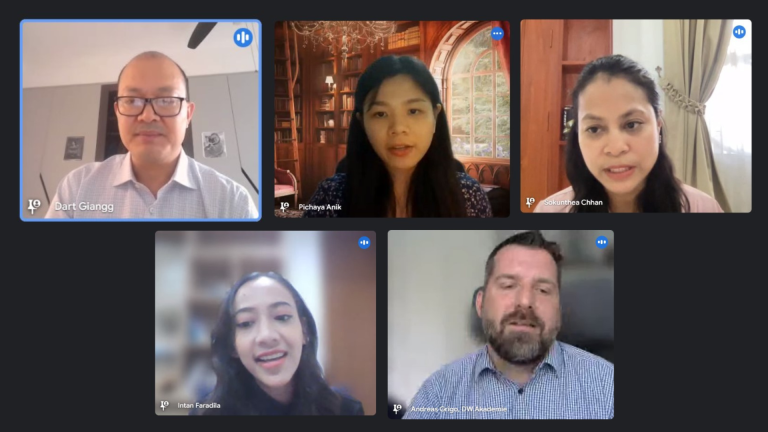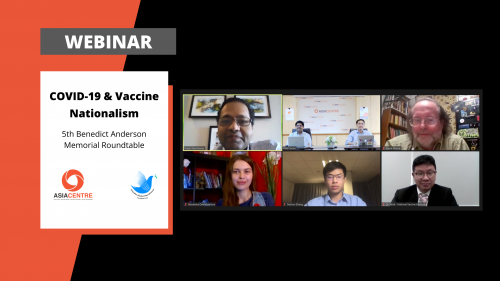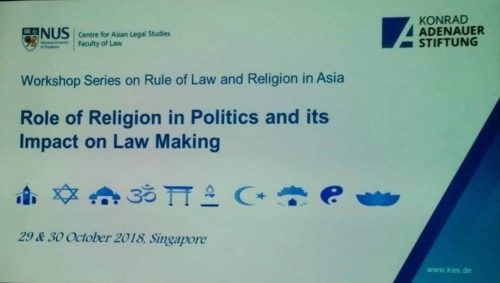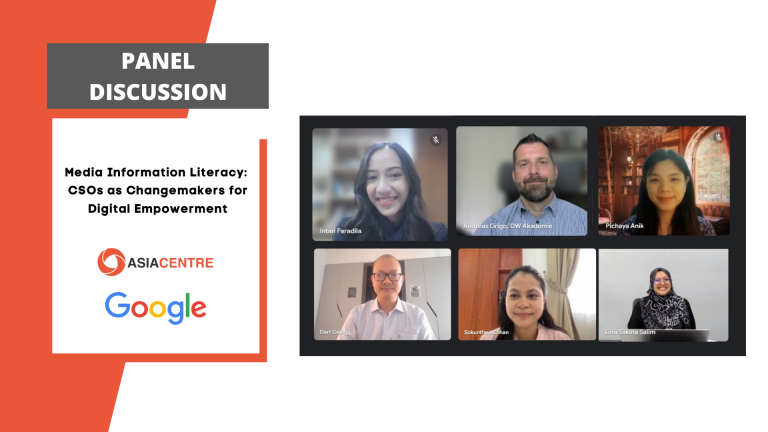
Civil Society Organisations (CSOs) in the region can play an important role to strengthen media literacy for underrepresented groups – this was the thrust of the online panel discussion held on 16 May 2024 convened by Asia Centre.
The event is a part of the Digital Rights Programme for Civil Society Organisations, convened by Asia Centre with support from Google Asia Pacific, to engage CSOs and their partners that currently work on the issues facing digital rights in the Asia-Pacific region. The programme, which started in December 2023, spans a year-long run of thematic online and onsite activities to bring CSOs together to address digital rights issues that they might experience.
During this discussion, speakers highlighted the significant impact of civic activism and the diverse literacy initiatives across Southeast Asia. Speakers shared their experiences, challenges, and best practices for enhancing their communities’ media literacy. The session also provided an opportunity for speakers to share their MIL materials on their open-sharing platforms with the participants to further encourage MIL learning.
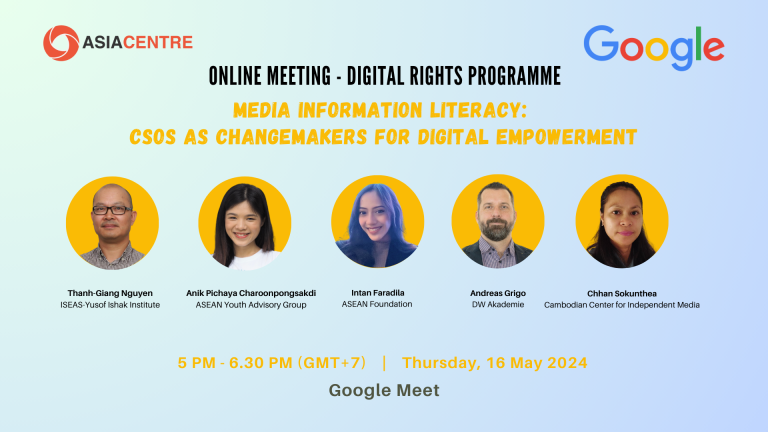
The panel discussion featured speakers Thanh-Giang Nguyen from ISEAS-Yusof Ishak Institute, Anik Pichaya Charoonpongsakdi from the ASEAN Youth Advisory Group, Chhan Sokunthea from the Cambodian Center for Independent Media, Intan Faradila from the ASEAN Foundation, and Andreas Grigo from DW Akademie. Lina Salim from the Asia Centre facilitated the session.
Thanh-Giang Nguyen, a visiting senior fellow at ISEAS-Yusof Ishak Institute, discussed the impact of civic activism through informal charities in Vietnam during COVID-19, focusing on two online communities in Hanoi and Ho Chi Minh City. He highlighted their use of social media for citizen journalism and charity work as alternatives to government media. Despite cybersecurity law challenges, these groups effectively mobilised change and influenced COVID-19 policies. He emphasised the importance of civil society organisations and called for more state support for their efforts.
Anik Pichaya Charoonpongsakdi, an ASEAN Youth Advisory Group member, discussed her “Think, Care, Share” campaign in Thailand, part of the ASEAN Digital Literacy Programme. The project educates high school students on identifying fake news and promoting media literacy. Anik stressed the students’ roles as content creators and media consumers, encouraging them to share their knowledge. Through online and on-site sessions, students learned about fake news and created online content to share via social media. The campaign reached over 50,000 people, empowering students and teachers and highlighting the need for collaboration, monitoring, evaluation, and sustainability.
Chhan Sokunthea, Executive Director of the Cambodian Center for Independent Media (CCIM), discussed efforts to engage youth in media and information literacy. She highlighted collaborations with civil society to promote media literacy, especially among university students. Despite challenges in press freedom and digital rights, CCIM remains committed to expanding outreach and promoting digital inclusion, particularly in rural and indigenous communities. She emphasised the need to address the digital divide and empower Cambodians, especially youth, to navigate digital information complexities.
Intan Faradila, Project Officer from the ASEAN Foundation, provided insights into its ASEAN Digital Literacy Programme (ADLP), sharing its objectives and achievements. She outlined the critical activities of the programme, including the development and localisation of digital literacy modules tailored to each ASEAN member state. Notable achievements include training over 193,000 individuals, engaging nearly one million through social media, and creating an e-learning platform to sustain the programme’s impact by hosting digital literacy modules and resources for MIL trainers to benefit from. She highlighted the ongoing efforts of trainers and urged further collaborations with local partners.
Andreas Grigo, Programme Director of Digital Resilience and Dialogue at DW Akademie, discussed successful media and information literacy (MIL) initiatives, emphasising global collaboration and knowledge sharing. He advocated for integrating effective MIL strategies across regions to accelerate progress and avoid redundancy. He highlighted the crucial role of youth engagement in MIL, as they are both digital media consumers and future decision-makers. He said he used technology to enhance traditional training methods, suggesting the development of digital tools and taking a comprehensive approach to MIL; combining global collaboration, youth engagement, inclusive education, and strategic use of technology.
Following the panellists’ input, the Q&A session provided further insights into MIL initiatives. Anik detailed the “Think, Care, Share” Project’s reach through online platforms, underlining the need for engaging MIL strategies for youth. Sokunthea addressed press freedom challenges in Cambodia, citing state control constraints. Thanh highlighted the significance of user-generated content during COVID-19, while Andreas advocated for collaborative MIL frameworks. Additionally, Intan showcased relevant initiatives in Vietnam, the Philippines, and Myanmar, focusing on reaching marginalised communities through innovative partnerships and offline learning modules. The speakers collectively emphasised the crucial need for comprehensive, collaborative, and sustained efforts in promoting MIL across diverse communities.
The event concluded with an announcement of the opening of Asia Centre Training Hub in Phnom Penh, Cambodia, and inviting participants to join the onsite meeting “Digital Technology in Cambodia: Challenges and Opportunities,” scheduled for 17 June 2024 at AmCam Exchange Center. Registration for the session is available here.
Participants are also invited to attend the next online meeting under the Digital Rights Programme focusing on “Surveillance & Privacy”, which will be held virtually on 18 July 2024. Registration for the session is available here.
Participants were encouraged to read and download the full report of the “Online Content Regulation in Asia-Pacific”, which was launched in January 2024. They were also invited to join interactive Signal Group for the CSOs network for this programme.
Asia Centre is a civil society research institute in Special Consultative Status with the United Nations Economic and Social Council. It serves as a knowledge partner and undertakes evidence-based research as well as provides capacity-building training for end beneficiaries. If you would like to collaborate with the Centre, please send an expression of interest to contact@asiacentre.org.
Follow Asia Centre’s social media channels for more information.

